INTERVIEW: Josephine Burton Shares her Ideas on Russian Art and Running of Dash Arts. By Anna Prosvetova
Josephine Burton co-founded Dash Arts with Tim Supple in 2005. Since then, they have produced cross-art cross-cultural work in the UK, ranging from an Indian A Midsummer Night’s Dream to an Arabic Series of live events. Focusing on experiences of art as a phenomenon through which we engage and see the world, the company have tried to address the contexts that are both topical and problematic, with an emphasis on art available in the shape-shifting cultural climate of London. Anna Prosvetova spoke to Josephine about Dash Arts’ most recent season, Revolution 17, their new projects, and inspirations drawn from the arts in the post-Soviet states.
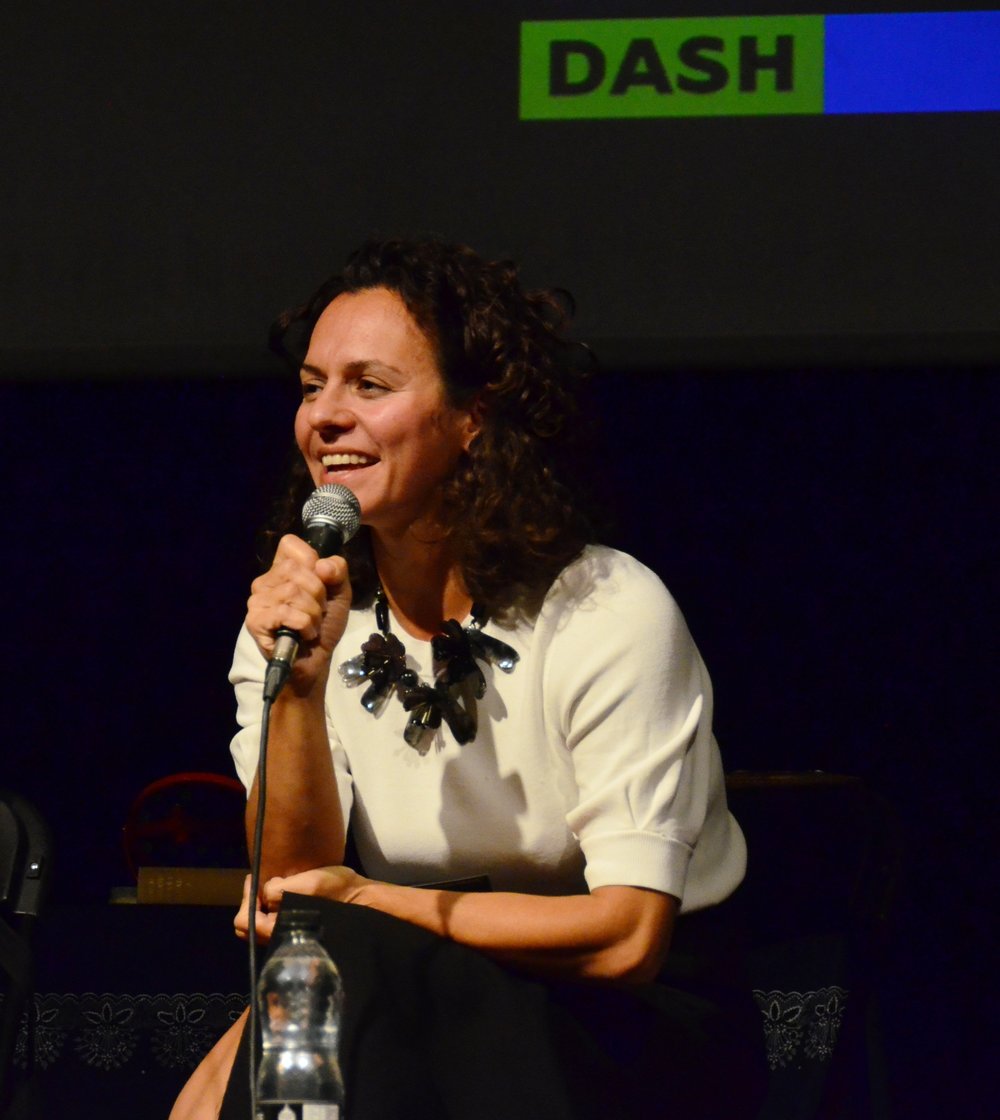
Josephine Burton. Photo cortesy of Dash Arts
Anna Prosvetova: Josephine, could you start by telling our audience more about Dash Arts foundation and its activities?
Josephine Burton: I set up Dash Arts with the co-director Tim Supple to make new work with international artists in theatre, music, art, and dance. Over the last 11 years we have researched, investigated, read, travelled, watched and listened a lot. We organised workshops and made new work with artists. Often we make our work abroad and then tour it around other countries. Tim made a large-scale project in India, A Midsummer Night’s Dream, when he spent 18 months meeting and talking to people, watching different shows before he made this piece. It was performed in eight Indian languages, was very physical and beautiful. Everyone brought their own world and artistic language to this piece. It was played to hundreds of thousands of people around the world. Then we made a project on a larger scale in the Arab world. We travelled around the region, made a series of musical, dance, and theatre pieces with artists from the Arabic-speaking world, trying to understand what was going on today in that region.
And then we began the journey into the post-Soviet Union territory. The idea of this journey was slightly different. We wanted to look, in a wider way, at what it was like to live under the Soviet regime and what it feels like today to live in its shadow. Over the last four years we have travelled, and met extraordinary artists, workshopped, rehearsed, and created across the region and in London. Similar to our experience in the Arab world, while working with the post-Soviet territory we discovered so many extraordinary ideas, music, theatre, books, and stories that really inspired us and became a part of the project, but we could not always show them. So, over these 4-5 years we developed the idea of Dash Café. Every month through the Café we have been able to showcase different elements and things that we came across, that inspired us and we wanted to learn more about. It really has been a weaving of ideas across the centuries: we screened the Georgian silent film “Grandmother” from 1927 with light improvised music; we did something on Brodsky, we did something around Vladimir Vysotsky and Viktor Tsoi; we watched Sergei Paradjanov films and talked about the genocide against the Armenians. We also looked at Crimean Tatars and what happened in the 1930-40s.
We also launched books, including The Last Man in Russia by Oliver Bullough, and we are planning more book launches this year, including Boris Dralyuk’s new translation of Babel’s Odessa Stories. The Dash Café is an opportunity for us to look forwards and backwards, but also look across the art forms and geographies. It is not just a Russian project. We did, for example, a large project on Central Asian culture in late 2015. It also allowed us to develop a gig series, inviting many interesting performers, including Aisha Orazbayeva from Kazakhstan, Anton Maskeliade from Russia, Sasha Ilyukevich from Belorussia and others.
Later, the Dacha project emerged, where we were able to create the immersive world of the Russian dacha. For this grand event we create a beautiful installation of a dacha and it can feel like a dacha in 1917 or as a more recent dacha. It is also a place for us to perform gigs, to show films, or to perform plays.
Anna Prosvetova: Josephine, this year will see many events, dedicated to the centenary of the Russian Revolution. Could you tell us more about Revolution 17 season organised by Dash Arts? What is the idea behind it?
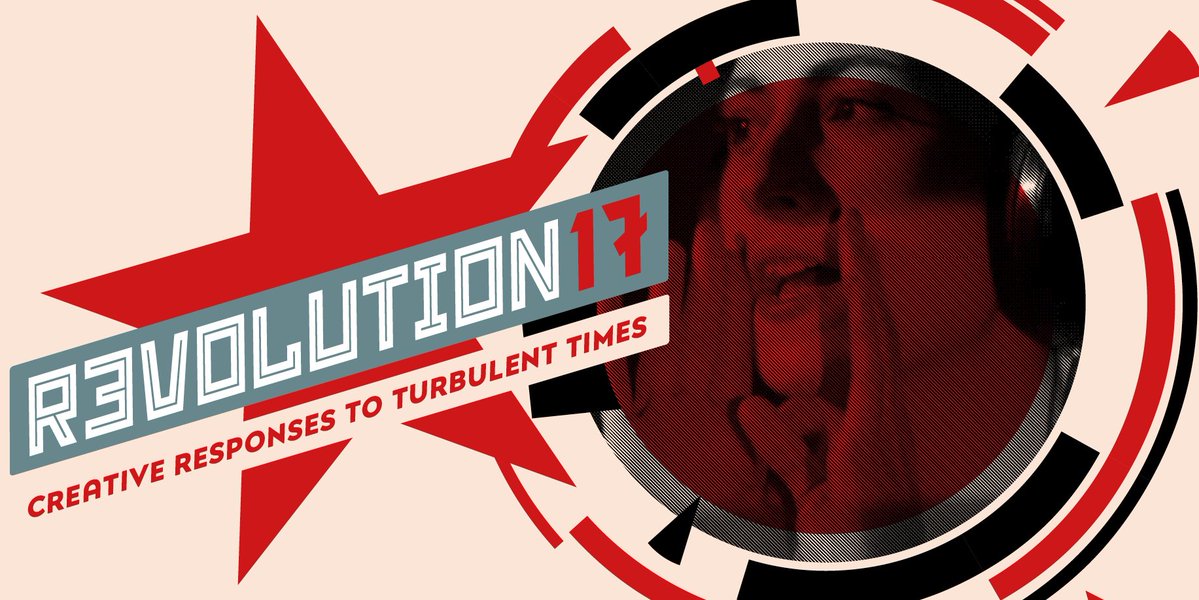
JB: That project evolved over the last 4-5 years of our work in the post-Soviet states. It was never our direct intention to culminate it in this centenary year. We were not necessarily interested in making some grand statements and judgements on the centenary, but on the other hand it became a wonderful excuse for us. Making new work about the experience of living during the Soviet times and its shadows in this year gives us this amazing ability to work with artistic inspirations from across the century.
The real focus that we have been working on over the last four years has been our new work: new piece of music, art, and theatre with artists from the post-Soviet region. Through this long process of research and discovery we have been able not only to showcase some extraordinary contemporary living artists, musicians, and writers, but also to reveal lesser known amazing ideas from the past. The Revolution 17 season is partly about what is happening today, but it has to be seen in the context of what has happened before. This year we will present many events and gigs, including Radio Gagarin night, and a Siberian band The Jack Wood. Together with KinoKlassica Foundation we are going to screen The Battleship Potemkin with a live improvised score.
We have also been working with some amazing theatre writers and theatre makers, including Maxim Koroshkin from Ukraine, and Tim is working on a number of new theatre works with actors here in London and actors in the post-Soviet region. We also have a project called Twistov, which is an adaptation of Oliver Twist through the eyes of an immigrant in London today, working with the actors from the post-Soviet countries based in London. There are also other things happening over the summer. There will be Dacha at Rich Mix in June, and we are planning to announce Dacha at another venue in London fairly soon. So, there are a lot of new shows planned for this year.
AP: How did you come up with the idea of Dacha project?
JB: For this idea I have to entirely credit the Latitude Festival, which was our first home. I chatted with the Festival’s producer Tania Harrison, and she mentioned that she’d love to bring some Dash Arts work to the Latitude Festival in Suffolk, to the faraway forest. It is an alternative part of the Festival, which has music stages and a theatre tent, and there is a little area of the woods, which is quite hilly, with little tents. She suggested we brought the Dash Café, but a Café is a very discreet thematic event, which usually lasts around two hours, when we do a gig or a film, and conversation. It would not work as a festival for a weekend, and I suggested we create something bigger than a café. The theme of the Festival was “Secrets and Lies” (it was in 2014), and I thought that we could do something with the theme of NKVD secret service and the ways of telling secrets, trying not to disclose hidden stories. I began thinking about a domestic space in a countryside, and it was a natural evolution for the Dacha. We worked with a wonderful Australian designer Bryan Woltjen, and together with our team we immersed ourselves in the Dacha world.
What I love about the Dacha is that it can be both an installation, a complete idyllic retreat, where you just walk into a world and it looks beautiful, slightly nostalgic, and unreal. It can also be a time-travelling space, because a dacha is the place that doesn’t really change, ideally. You break a glass, and you might replace the glass which doesn’t match the set, but the whole doesn’t really change. I like this idea that you can create one world that could be the same, and yet could travel through a complete historical change, and reflect on this. The pictures on the wall will change: Tsar Nicholas II is on the wall for just the first day, and then he is replaced by another leader. This also bought some interesting discussions: if Stalin’s portrait should or should not be on the wall; what do you put on the wall in the post-Soviet world; did religious icons stay and what maps do we have that would reflect the period?
Then it also creates an extraordinary venue for the performance, and being a cross-arts organisation we love to move quite fluidly between music, performance, dance, and a play, and at the Dacha you can do that. We can change the furniture so we can show the film on a home screen. Then we can change the room again, and we are all around the dining table having a conversation. Another change – and there are musicians playing in the kitchen, and we move the chairs around so we can see them. We have a tradition in our Dacha that in the afternoon we perform the latest play from Moscow, Petrograd or Leningrad, depending on the period, and invite everyone at the Dacha to be a part of it. Then we roll up the carpet, and have a DJ in the end of the night. I love that the Dacha can be so versatile, it is a beautiful thing. It’s so much fun!
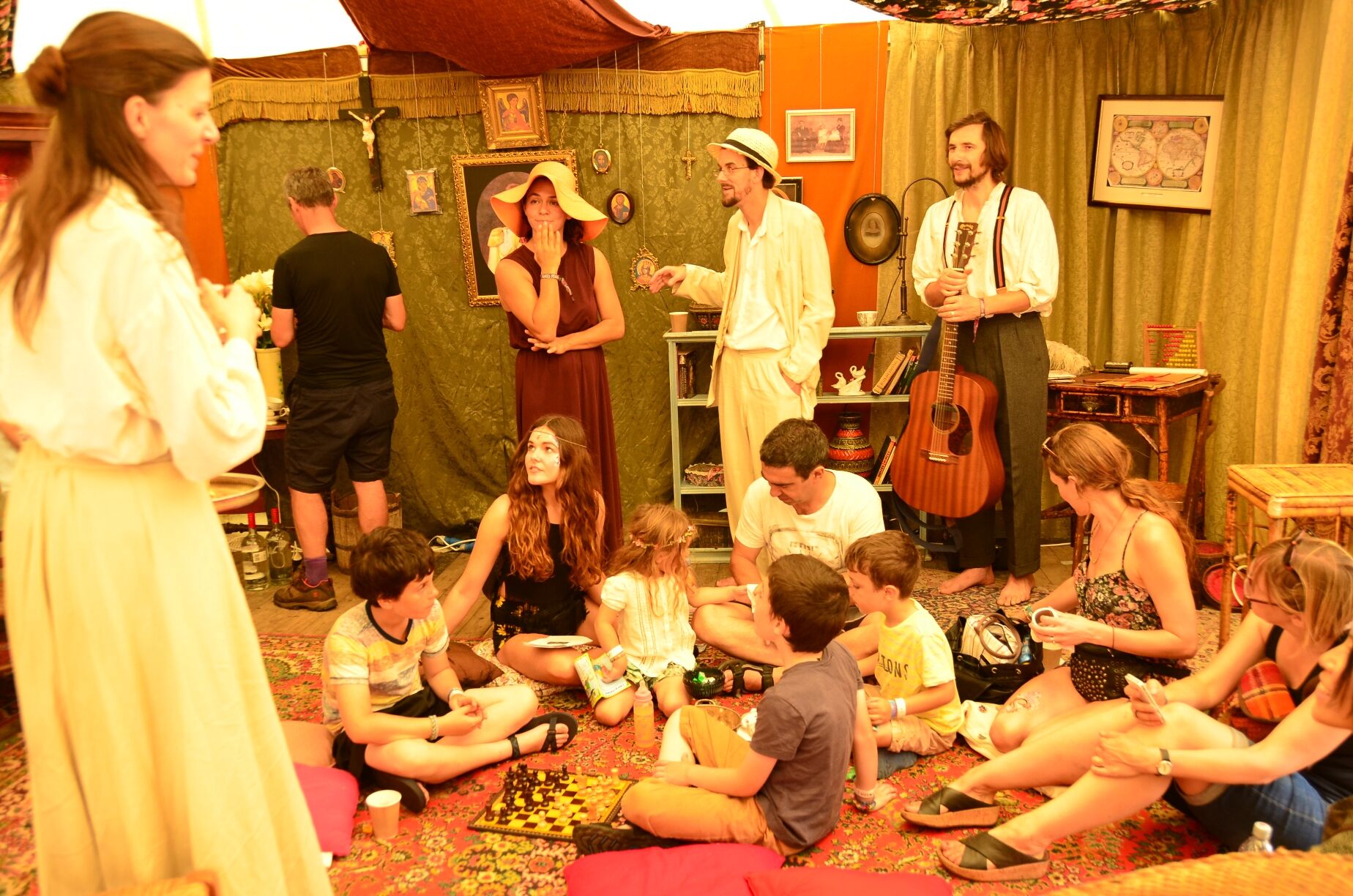
Dash Arts Dacha – Latitude Festival 2014 © Anna Lukanina
AP: Dash Arts works not only across cultures, but also across different forms of art: cinema, literature, dance, theatre… How do you select what do you want to work on? Is there a bigger picture a new project should fit into?
JB: Tim and I are both artists. I am a musician and singer, and I am driven by my own musical interests and things that excite me musically. Tim is a theatre director and he has a similar approach. There is something that drives us artistically, personally, but we are seeking surprising, interesting, highly exceptional work. There is also the other side: the work we make, and we are more integrally involved in. For example, in January we hosted the first bit of the London end of a project dedicated to a Russian Futurist poet Velimir Khlebnikov, who died in 1922, a project I have been working for few years with visual artists. I am interested in commissioning artistic responses to Klebnikov’s writing. We are building an open studio where we will commission contemporary artists from Ukraine, Russia, Georgia and across the region or the UK of Russian background to create a new piece of work inspired by the Utopian Futurist dreamings, revolutionary dreams of the writer, who wrote poems, plays and manifestos. I am interested in the idea of creating a vision for the future and the process of dreaming about the Utopian world. The minute it’s finished and created, this Utopian quality is not quite as perfect as you’ve hoped, so I’m interested more in the dream.
In September 2014, I worked with a gallery in Batumi, Georgia, to host a symposium, where we invited a bunch of artist, including Iced Architects, Nikita Kadan, and some other exceptional artists from Georgia, Uzbekistan Azerbaijan, and Ukraine. It was the moment where we started talking about this project, and it was there that Iced Architects envisioned this installation of electronic interpretation of some of Khlebnikov’s poetry. I was delighted that on 26 January 2017 we simultaneously with Pushkin House held an event with King’s College London where we talked about the next steps of the project, and how we will showcase the process of it. I am hoping later in 2017 to work with King’s Russia Institute, and Ukraine’s REP (Revolutionary Experimental Practice) to develop these ideas further.
There is another project I have been working on for a few years now, which came out an encounter Tim and I had on our very first trip to Russia in 2012. I spent some time in conservatoires in Moscow and St Petersburg. It was an extraordinary experience to be in Tchaikovsky conservatoire and have the sounds seeping from the rehearsal rooms or studios throughout. I felt like I could taste that world. And going to Rimsky-Korsakov conservatoire in St Petersburg made a similar impression on me. It was amazing to be in the place where Rimsky-Korsakov, Rachmaninoff, Prokofiev, and other major Russian composers premiered their works. At the same time during these trips I heard many stories about what have happened to classical music over the last 25 years, what happened to all these classically trained artists, who for many different reasons have sought careers outside traditional classical music. Obviously, there is an economic factor, that drives people to seek pop music. For example, when I was in Almaty, Kazakhstan, I met many classical musicians who work with pop music. In Azerbaijan many musicians are focusing on developing national folk music, and it is quite political, because it is about creating an Azerbaijani identity which has nothing to do with the Soviet period.
There was also an artistic impulse, which interested me a lot. After the collapse of the Soviet Union it was possible to encounter and listen to music which has not been played before, and I was interested in what it did for the musicians. More than four years ago, the people and stories I encountered opened up so much for me, and allowed me to develop a project with some extraordinary musicians across that region. I’m working with a Moscow composer Alexander Manotskov, who is a very interesting creative person: he is a cellist, singer, composer, writer, and a poet. Together we brought an ensemble of 11 musicians from across the former Soviet States, who play different instruments and have different stories. Last May we came together in Kazbegi, Georgia, to start the creation of this project, which will be a piece of music and theatre. I’m also working with a playwright Natasha Vodoshpit, who is creating a text which will be a part of the piece, and a theatre director Galina Pianova from Almaty, who is helping me with its direction. We hope that this new piece of theatre will premiere in the UK this year.
AP: What kind of audience do you usually attract to you events? And how does the British audience react to new pieces produced by the artists from the post-Soviet world?
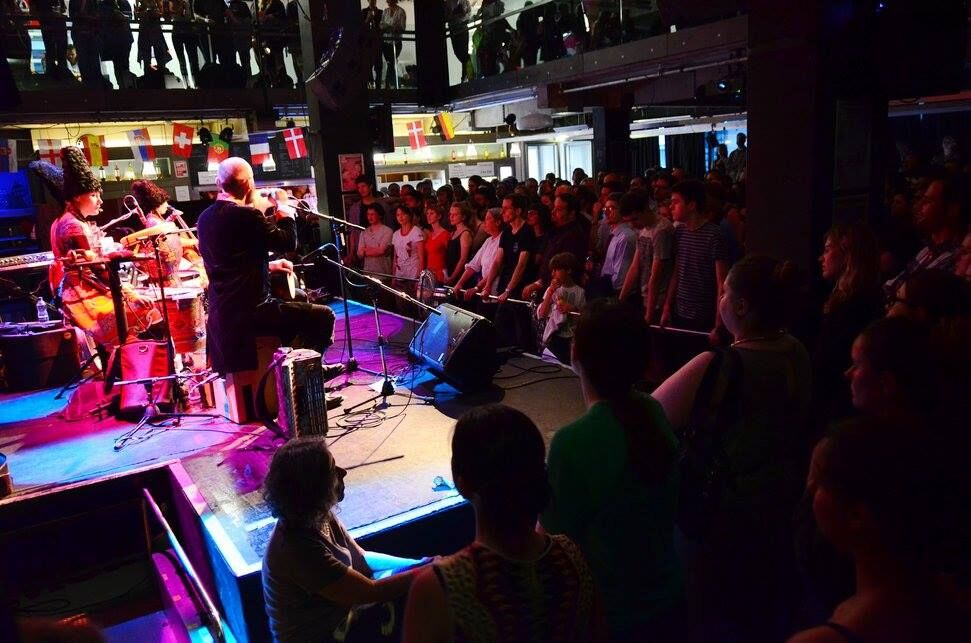
DakhaBrakha at Rich Mix 2016 © Anna Lukanina
JB: Ultimately, we are not a Russian organisation or Georgian or any other nationally focused organisation. We are an arts organisation, that makes and presents extraordinary work by artists from around the world. Therefore, we hope to attract as wide an audience as possible, who can appreciate this exceptional work, wherever it came from. This has always been our ultimate intention, and that is why in the past we tend to work with national venues that have a wide audience reach, including Roundhouse, Rich Mix, Sadler’s Wells, King’s College, or Barbican. It is also very important for us that we develop and have audiences whose culture is reflected in the work that they see, or vice versa – the culture on our stages is reflected in our audiences. Our Dash Café, Dash Gigs, and the Dacha become a way for us to develop audiences across those diverse communities.
We often partner with local community’s organisations like the British-Georgian society, Ukrainians in London, or Pushkin House to make sure that we are including and focusing on these audiences. There is a good challenge for us, because we are pushed by the knowledge and depth of experiences, ideas, and personal contacts of these audiences. It pushes us to research deeper and make sure we are not presenting a superficial glimpse into the world. I present an event on Vladimir Vysotsky for example where four or five people in the audience actually saw Vysotsky’s Hamlet live. I know I’m going to have such situations, so I have to know what I’m talking about. Or when we launched Peter Pomerantsev’s book in early 2016, there were some people in the audience who found it hard to take in some ideas which came up in the conversation, and we tried to create a non-judgemental environment for discussions.
AP: I think before Soviet Union was seen as something exotic, and people were interested to learn more about the country and its people. Today, with all the political tensions people are interested in Russia again, but in many cases this interest is influenced by the existing stereotypes.
JB: I think it is a very interesting question. What we always wanted to do in our work is to go deeper and to move beyond the stereotypes. That was definitely the case when we worked in the Arab world. When we started it, we were interested in going beyond the dramatic newspaper headlines. And when we were in the middle of this project, the Arab Spring happened, and people became much more engaged and interested in the region. In a way we gained a much wider audience, because people wanted to know what was happening in Tunisia, Egypt, and other countries, but it also became more difficult for us to make this work. We were going to open a show that Tim made, One Thousand and One Nights, with a cast of 21 actors from across the Arab world. We were in Luminato festival in Toronto, who commissioned it, and we were going to Chicago across the US border to the Shakespeare Theatre there for the US premier. And visas of nine of the Syrian actors who were in our cast were revoked. Suddenly, we had to cancel the show with a week notice, which was not only incredibly sad for the show and the actors, but also really financially challenging for us. I suppose, we have a weird knack of hitting some kind of zeitgeist, because the same thing happened with the work we are doing in the post-Soviet territory. We started it before Putin was elected for his third term, and people were talking about Russia-Britain year of culture and other collaborations; it was a different energy back then.
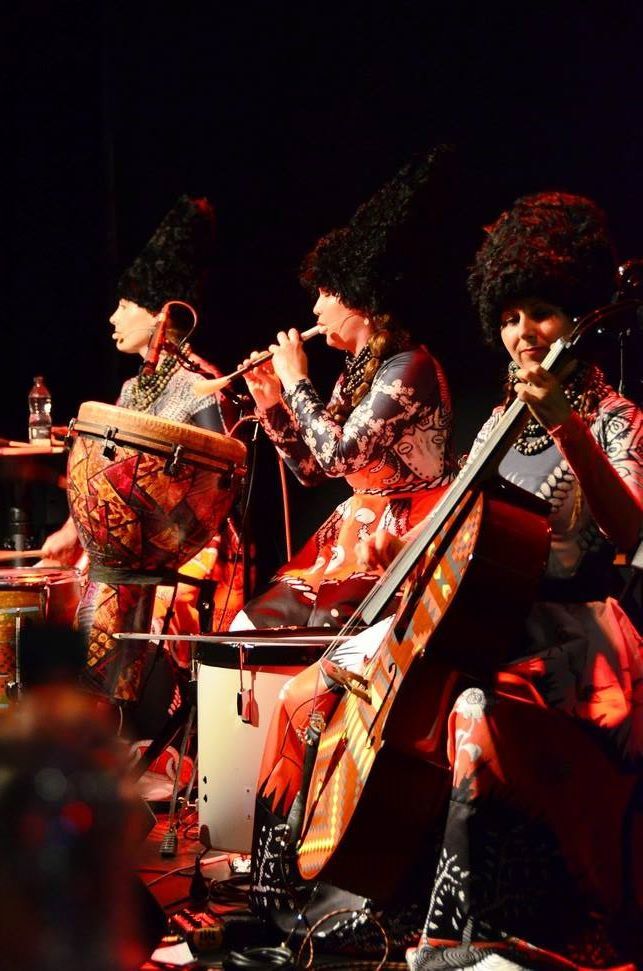
DakhaBrakha at Rich Mix 2016 © Anna Lukanina
AP: How did you become interested in all things Soviet and Russian?
JB: I think it relates to my last answer. Tim and I spent a large part of our lives watching the world behind the Iron Curtain, for many years the Soviet Union was the enemy, the Other. Yet, despite not having much information about it, there was always extraordinary music, unbelievable literature, and the films, that we did see, were amazing. There was that tension that was always interesting to explore more. As I mentioned earlier, we are interested in going deeper, and I believe that the more you understand about another culture, the more you understand yourself. So, this was the world I wanted to understand better.
AP: Josephine, what are your future projects?
JB: Revolution17 is the focus of our year. We’re also developing a large-scale music project, written by a wonderful living composer Osvaldo Golijov, the author of Passion of St Mark. It is actually a Latin-American piece of music that I am going to do in the UK with musicians and students from all over the UK, and Tim has a wonderful long term worldwide project with Shakespearean King Lear. Another enormous project on our calendar for 2018 is “EU-TOPIA”, where we are trying to understand what is going on with the dream of Europe, the UK’s relationship to Europe and, in fact, the world’s relationship to Europe.
There is another project we have been working on over the last four years, where we collaborate with the UK based artists. These musicians, artistes, dancers, creative producers, designers were not born in the UK and lack a lot of professional skills, contacts, and opportunities comparing to people who went through a more traditional career path here. We are developing a special programme of support which will be a programme of workshops, mentoring opportunities and laboratories.
AP: Sounds like an exciting project! I think it is extremely needed for a stimulating creative career in the UK.
JB: Yes, and for us it will be also another way to continue to meet people and work with them, possibly invite them to become a part of our shows and performances.
AP: I know that you are also planning to move to a new performing arts centre in the cultural quarter in Woolwich. Could you tell us about this development?
JB: Yes, it is an exciting long journey. The extraordinary historic buildings within the Royal Arsenal at Woolwich will house a new kind of performing arts theatre in which international theatre, music, dance, art, film and food can be enjoyed in the same programme. After a decade of working on award-winning and ground breaking productions, we are thrilled to begin a long and deep relationship with Woolwich offering audiences, participants and artists a unique blend of performance and experience from far and wide.
AP: Do you have any plans of bringing your events and projects to the post-Soviet states?
JB: I’d love to! I am hoping that The Renegade Orchestra, the piece of music I’m working on now with Alexander Manotskov, will travel to Georgia or Russia. It would also be wonderful for our Dacha project to visit the region. We have build an amazing network of contacts in these countries, and I hope that tours and presentations of our work will happen. For example, the Khlebnikov project started in Georgia, and I know that they are keen for it to return.
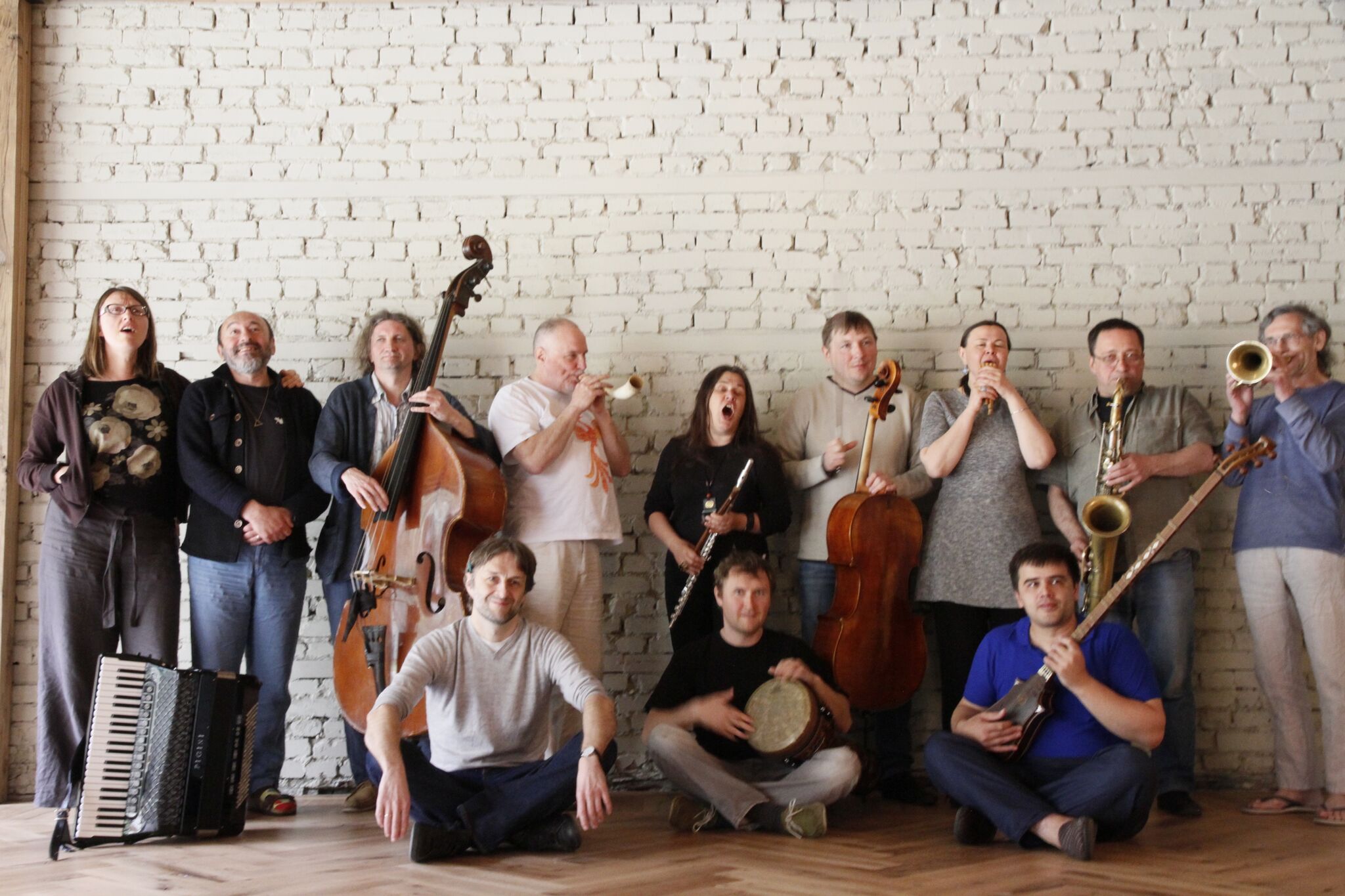
Renegade Orchestra © Aurelia Rossegger
AP: Thank you, Josephine! Looking forward to you future events!
Please click here for more details on the Revolution 17 project.
This interview was originally published on Russian Art and Culture.